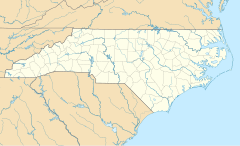Bald Head Light

"Old Baldy"
|
|
| Location | Bald Head Island, Cape Fear River, North Carolina |
|---|---|
| Coordinates | 33°52′24.5″N 78°0′24.5″W / 33.873472°N 78.006806°WCoordinates: 33°52′24.5″N 78°0′24.5″W / 33.873472°N 78.006806°W |
| Year first constructed | 1817 |
| Year first lit | 1817 |
| Deactivated | light beacon, 1935 radio beacon, 1958 |
| Foundation | Dressed stone |
| Construction | Brick |
| Tower shape | Octagonal |
| Markings / pattern | Mottled stucco plaster (originally whitewashed) |
| Height | 110 feet (34 m) |
| Original lens | 15 lamps and reflectors, 1817 3rd order Fresnel lens, 1855 4th order fixed Fresnel lens, 1903 to 1935 |
| Current lens | none |
| Range | 14-15 miles (Fresnel lens) |
| Characteristic | fixed white 1817 flashing red with 30 second delay 1834 flashing white 1893 fixed white, 1903 to 1935 |
| ARLHS number |
USA-032 |
|
Bald Head Island Lighthouse
|
|
| Nearest city | Southport, North Carolina |
| Area | 2 acres (0.81 ha) |
| Architect | D.S. Way |
| NRHP Reference # | 75001242 |
| Added to NRHP | April 28, 1975 |
USA-032
Bald Head Lighthouse, known as Old Baldy, is the oldest lighthouse still standing in North Carolina. It is the second of three lighthouses that have been built on Bald Head Island since the 18th century to help guide ships past the dangerous shoals at the mouth of the Cape Fear river.
A 10-acre (4.0 ha) site on the west side of Bald Head Island, along the banks of the Cape Fear River, was selected for North Carolina’s first lighthouse. The property was purchased from Benjamin Smith, who would later become the governor of North Carolina. In 1792, Congress appropriated $4,000 to complete the lighthouse that had been started by the North Carolina Colony before becoming part of the United States. Work on the lighthouse was overseen by Abisha Woodward, who would later build five lighthouses along the Connecticut coast and one in New York on the east end of Long Island, two of which still stand at New London, and Falkner's Island. The lighthouse, which was first activated on December 23, 1794, directed traffic to the Cape Fear River and the growing port of Wilmington, located several miles upstream. In less than two decades this lighthouse was threatened due to severe erosion of the river bank. Between 1813 and 1817 funds were approved for rebuilding Bald Head Lighthouse.
The replacement lighthouse now known as "Old Baldy" was completed by 1817. Old Baldy was built further inland where it would not be threatened by shifting sands along the river for just under $16,000 using bricks salvaged from the old tower. A stone plaque above the entrance identifies the builder as Daniel S. Way, and the foundry for the lantern room, that was also salvaged from the old tower, as R. Cochran. The octagonal brick tower is coated with stucco and stands 110 feet (34 m) high, the exterior was originally whitewashed. At its base, the tower is 36 feet (11 m) wide and at its top 14.25 feet (4.34 m) wide, while the walls are 5 feet (1.5 m) thick at the base and taper to 2.5 feet (0.76 m) at the top. The rectangular stairway leading up the inside of the tower is made of Carolina yellow pine. The lantern room sits on top of one of the tower support beams which makes it offset from the center of the tower. Old Baldy was originally equipped with an array of 15 lamps and reflectors, and as technology improved, it later housed a Fresnel lens.
...
Wikipedia

